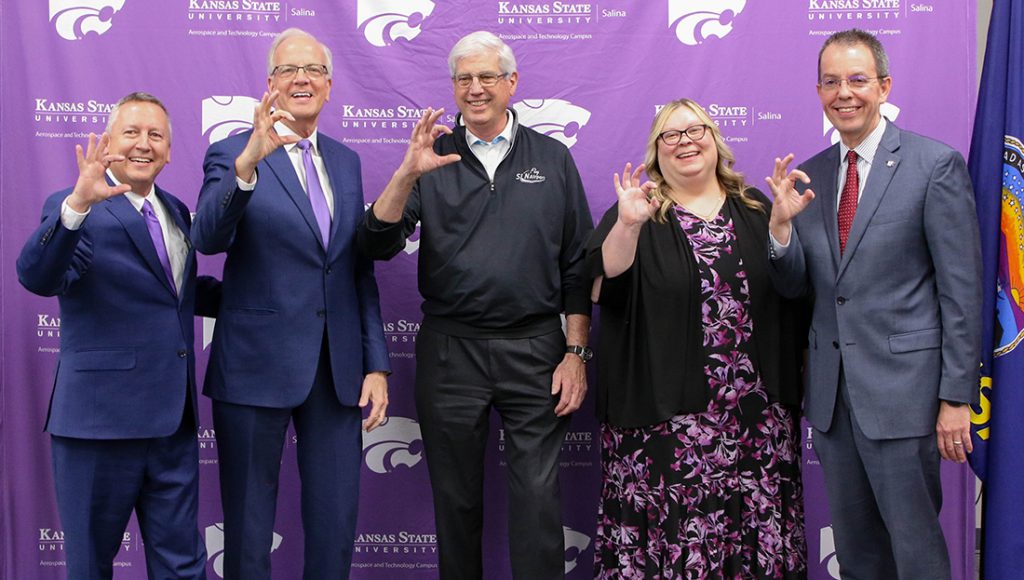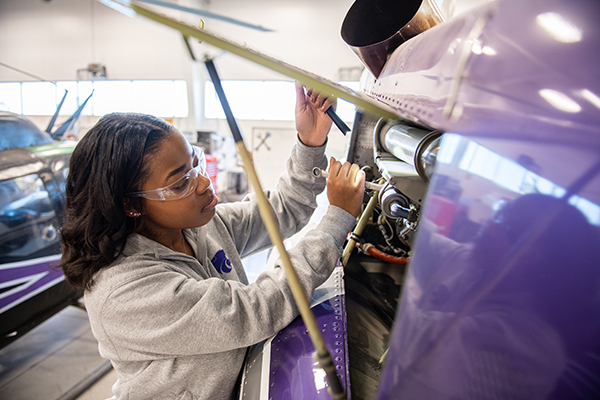Photo above – K-State Salina’s new Aerospace Education Hub expands the space for programs in unmanned aerial systems, advanced composites and aviation maintenance, while a partnership with the National Oceanic and Atmospheric Administration strengthens pilot training programs.
Kansas State University continues to adapt to meet the needs of the next generation of pilots, mechanics and other aeronautical engineering positions, with more than $33 million in new federal funding for Kansas State University Salina Aerospace and Technology Campus set to expand programming to support learners and industry partners.
U.S. Sen. Jerry Moran announced a transformational federal grant to build a $28 million facility that will serve as an education hub for several of K-State Salina’s programs. He also announced a separate $5.5 million grant to provide aviation training equipment to amplify the pilot training partnership with the National Oceanic and Atmospheric Administration, or NOAA.

“The federal resources I worked to secure will grow K-State’s research and development footprint to better serve Kansans and attract new students and faculty to Salina,” said Moran, a senior member of the Senate Committee on Appropriations. “It has long been my goal to make certain Kansas is a place where students can find a quality education and a fulfilling career without having to leave the state. K-State Salina is a hub for learning, research and innovation, and these federal resources are an investment in expanding the great work being done at the university.”
The Aerospace Education Hub and the partnership with NOAA reflect K-State Salina’s continued commitment to aeronautics education, especially as the aerospace industry continues to grow in its demand for groundbreaking research and well-equipped, job-ready graduates.
“This investment marks the next phase in K-State Salina’s continuous growth,” said Alysia Starkey, CEO and dean of K-State Salina. “As we develop this new, state-of-the-art space for our uncrewed aircraft systems, composites and aviation maintenance programs, we are also establishing the future of aerospace education. The alignment of these critical disciplines enables K-State Salina to educate learners, collaborate with industry and further advanced air mobility solutions for the region and nation.”
The new facility is the second phase to revitalize the southernmost end of the K-State Salina campus as the General Atomics Aerospace Innovation Ramp, following General Atomics’ $10 million gift to kick off the revitalization plan in October 2022.
The anchor of the Aerospace Innovation Ramp is the Aerospace Education Hub, which will house the Kansas AAM Flight Test and Training Center, the Advanced Composites Laboratory and the Aviation Maintenance Training Center.
• K-State Salina’s Applied Aerospace Research Center is nationally recognized for its work in promoting the commercialization of uncrewed aircraft systems. In addition to its current work, the new facility allows the center to expand its scope to include emerging aerospace technologies in advanced air mobility and commercial space applications. The new Kansas AAM Flight Test and Training Center will focus on providing regional air mobility and autonomous vehicle usage in the air transport of passengers and goods.
• When completed, the new Advanced Composites Laboratory will be an innovative educational facility that delivers holistic education on composite materials, including immersive and industry-driven learning experiences for learners and valuable research and knowledge for industry partners.
• An expanded Aviation Maintenance Training Center doubles the current space allocated for K-State Salina’s aviation maintenance training program. The center provides educational opportunities at all levels, from technical certification to bachelor’s degree credentials.
As part of a separate $5.5 million grant approved last week in the federal budget, NOAA will collaborate with K-State Salina to grow the pilot training program.
That partnership leverages the resources in K-State Salina’s existing undergraduate aviation programs and will equip students with the science, technology, engineering and math skills required to join the NOAA Commissioned Officer Corps, one of the eight federal uniformed services.
Through federal funding, K-State Salina will acquire aviation training equipment and create a custom, full-motion simulator based on the dynamic and diverse flight environments NOAA officers need to be familiar with on duty.
“K-State Salina continues to forge new paths for aeronautic education,” said Richard Linton, K-State president. “This federal investment opens the doors for enhanced educational programs and access, career readiness, technology-advancing research and industry partnerships to meet the demands of today and the future. This is what being a next-generation land-grant university is all about.”




